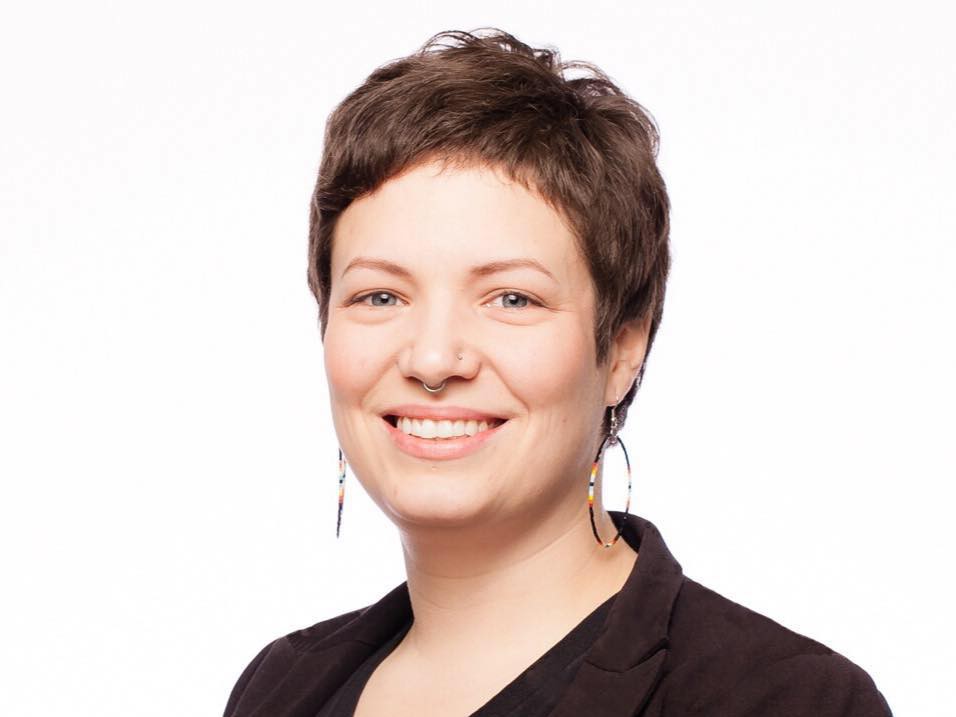
Student Jenna Vandal (supplied photo).
Graduation Pow Wow profile: Jenna Vandal
In the lead-up to the 30th Annual Traditional Graduation Pow Wow on May 4, UM Today is profiling a few of the Indigenous students who will be graduating. Below is the first feature on Faculty of Arts student Jenna Vandal.
“I grew up knowing I was Métis. I was never ashamed of it, but I didn’t know anything about it,” states Jenna Vandal, who is graduating this spring with a bachelor of arts, with a major in Native studies and a minor in geography.
A true advocate for the environment and Indigenous rights, Vandal has always carved her own path.
“I started school later than most people, at 25. I worked full-time for seven years after graduating from high school. I had just gotten by in all of my high school courses; I was not strong academically at all.”
What motivated Vandal to apply to the University of Manitoba was becoming more aware of environmental issues, fueling her knowledge through independent learning and watching documentaries. She enrolled at the U of M in 2012 and started taking classes in environmental studies. Although she enjoyed the program, it was a required Native studies course that changed her life.
“When I took that first (Native studies) course, I thought, ‘I knew this! This is what I’m supposed to be doing and where I’m supposed to be.’”
She decided to re-focus and major in Native studies. This presented the opportunity to learn Indigenous languages, better understand her own heritage and take part in a land-based education course, where she and her classmates spent weeks living off the land at the Grassy Narrows First Nation.
This course, in fact, was a source of inspiration for Vandal when she led the Rooster Town Blockade in 2017. A controversial land-swap deal had resulted in private ownership of acres of land that had historically been used by the Métis people of the Red River Settlement and “Rooster Town.” When the deal was made, Métis people had not been consulted. The blockade remained in place for two months.
“I learned how to be resilient, how to be brave. I never thought that I could stand in front of a truck and say, ‘This is Métis land; you can’t do this.’ But if you have enough love and think of your ancestors and what they’ve been through, as well as future generations, that love overcomes fear completely.”
Vandal became more active on campus as she continued her studies, spending a significant amount of time at Migizii Agamik – Bald Eagle Lodge. She feels the building is a wonderful example of the beauty of Indigenous architecture, and how integral Indigenous presence in the built environment can be in making people feel welcome on campus.
“The staff there are phenomenal. I learned about scholarship and bursary opportunities, and even had help on how to prepare [the applications].”
A year ago, Vandal and two other passionate students worked with the Manitoba Metis Federation (MMF) to establish the Bison Local at the U of M campus. Serving as the local’s co-chair, she says there are now close to 70 members who meet monthly to discuss Métis issues and provide grassroots input toward MMF governance. She believes that ‘indigenizing the academy’ — as well as other spaces — is important, and envisions that as not only seeing more Indigenous faces on campus, but also integrating Indigenous knowledges throughout the university.
“It’s not just using all of this Indigenous talent and skills in Indigenous studies. You want to have Indigenous influence in all of the faculties and all of the classes that are taught.”
When asked about post-graduation plans, there are a few options she is considering, including a teaching degree that specializes in land-based education, a master’s degree in Native studies and a law degree. The common thread is her desire to make a positive impact on the world and the environment. She wants to encourage current and future Indigenous students to persevere, and to take the time they need while accomplishing their studies.
“Look to those that have come before you as inspiration and keep your goals in sight. It would be so easy to give up and live a stress-free life where you don’t have to worry about changing the world — but I really want to bring change to the world. If I give up, I am giving up on the Earth and the animals that need our protection — and I can’t do that.”






